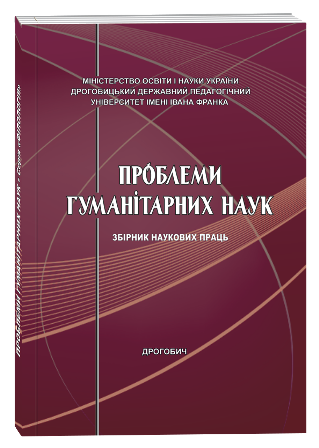THE MEDUSA EFFECT: THE CURSE OF MIRRORS AND SWORDS IN THE MASTERPIECES OF WORLD LITERATURE
DOI:
https://doi.org/10.24919/2522-4565.2023.57.10Keywords:
mythologeme, psychodynamic model, “Medusa effect”, unconscious mirroring, aggression, going above the psychodynamic modelAbstract
The article analyzes the Gorgon Medusa myth as a psychodynamic model, which is considered to be a theoretical idea of human behavior shaped by unconscious dynamic (interactive) psychological energies like sexual attraction, traumatic experience, imposed family values, etc., and outlines the results of applicating “the Medusa effect” as a technique of textual analysis with the initial points – a mirror (unconscious mirroring) and a sword (aggression) (the author’s method based on the principles of the systemic approach with the use of the mythological method, elements of the Jungian theory of archetypes, psychological, hermeneutic, post-structuralist and intertextual methods) on the material of a novella “In a Grove” by Ryūnosuke Akutagawa, psychological novel “The Steppenwolf” by Hermann Hesse and drama “The Stove Host” by Lesia Ukrainka. The dynamics of the aggressive behavior of the main characters, the triggers that provoke the archetype activation, the options for going over the Medusa’s psychodynamic model proposed in the texts are in the focus of studying. It was established that in a short story “In a Grove” by Ryūnosuke Akutagawa and novel “The Steppenwolf” by Hermann Hesse there are four types of characters whose actions are described by the Medusa’s psychodynamic model due to the option for going over – Tajomaru (“cutting off the head”, physical destruction), the samurai (self-destruction), the woman (isolation), Harry Haller (intellectualization). At another point, it is observed due to the same principle that there are three characters in a drama “The Stove Host” by Lesia Ukrainka whose actions are described by the Medusa’s psychodynamic model: Commander (a punitive Medusa), Dolores (a repressed, intellectualized Medusa) and Don Juan (a self-cursed Medusa). They oppose to Anna who treats like a Gorgon vulgaris, motivated with hunger for power to subjugate someone’s will. The relevance of the research and the prospects for further studies are determined by the fact that the results of in-depth analysis of iconic literary texts can be used in applied psychology in order to cope with behavioral disorders, in particular in the situations of repeated life scenarios (individual myths).
References
Акутаґава Р. Павутинка : вибрані новели / перекл. з япон. Івана Дзюба. Львів : Піраміда, 2020. 276 с. URL : https://chtyvo.org.ua/authors/Riunoske_Akutagava/Pavutynka_zbirka/.
Гессе Г. Степовий вовк. Всесвіт. № 4, 5. 1977. URL : https://chtyvo.org.ua/authors/Hesse_Hermann/Stepovyi_vovk/.
Гундорова Т. Леся Українка. Книги Сивілли. Гордість нації. Харків : Vivat, 2023. 304 с.
Еко У. Роль читача. Дослідження з семіотики текстів. Львів : Літопис, 2004. 384 с.
Єрмоленко В. Ерос і Психея. Кохання і культура в Європі : есеї. Львів : Видавництво Старого Лева, 2023. 496 с.
Забужко О. Notre Dame d'Ukraine : Українка в конфлікті міфологій. 2-ге вид., випр. Київ: Факт, 2007. 638 c.
Українка Л. Повне академічне зібрання творів : у 14 томах. Том 4. Драматичні твори (1912–1913) / ред. С. Кочерга; упоряд., комент. М. Моклиця, В. Соколова. Луцьк : Волинський національний університет імені Лесі Українки, 2021. 424 с.
Українка Л. Повне академічне зібрання творів: у 14 томах. Том 14. Листи (1907–1913) / ред. С. Романов; упоряд. В. Прокіп (Савчук); комент. В. Прокіп (Савчук), В. Агеєва. Луцьк : Волинський національний університет імені Лесі Українки, 2021. 616 с.
Фрай Н. Архетипний аналіз : теорія мітів. Антологія світової літературно-критичної думки ХХ ст. / ред. М. Зубрицької, 2-ге вид., доповнене. Львів : Літопис, 2002. С. 109–135.
Юнґ К.-Ґ. Архетипи і колективне несвідоме / перекл. з німецької Катерини Котюк; наук. ред. укр. вид. Олег Фешовець. 2-ге опрац. вид. Львів : Видавництво «Астролябія», 2018. 608 с.
Akutagawa, R. Rashmon and 17 Other Stories / trans. by Jay Rubin; intr. by Haruki Murakami. New York : Penguin Books, 2006. 268 p.
Akutagawa, R. Rashmon and Other Stories / trans. by Kojima Takashi; intr. by Hibbet Howard. Tokyo : Charles E. Tuttle Co, 1952. 110 p.
Hollis James. Mythologems. Incarnations of the Invisible World. Toronto : Inner City Books, 2004. 158 p.



